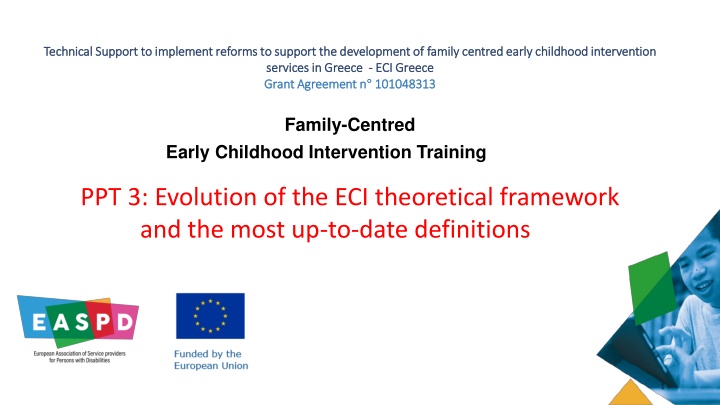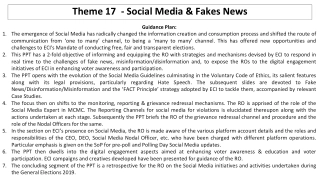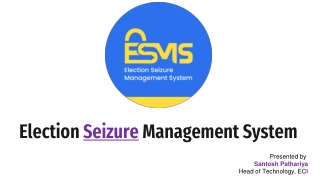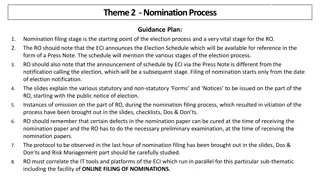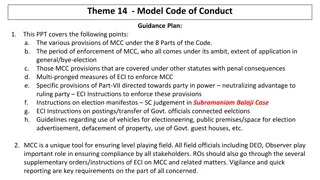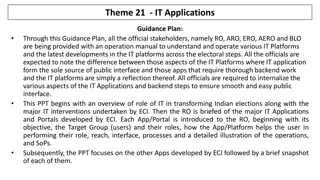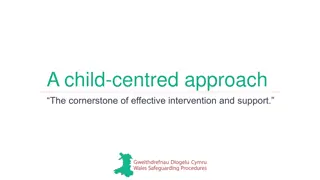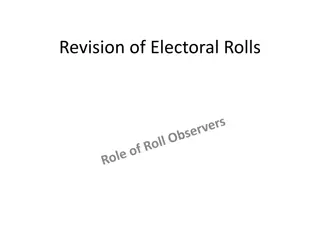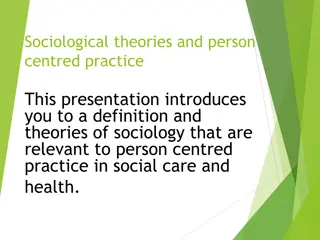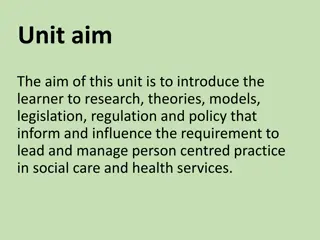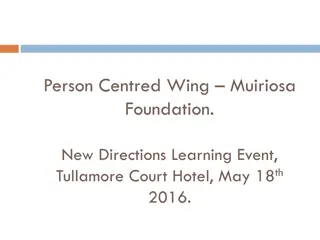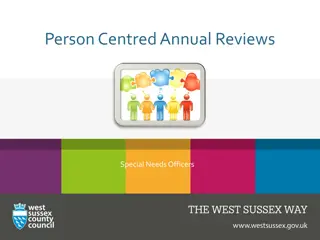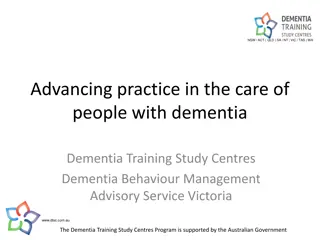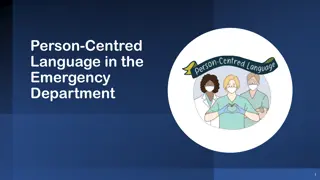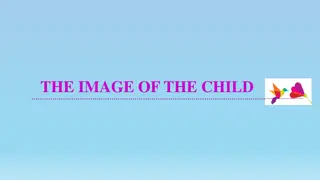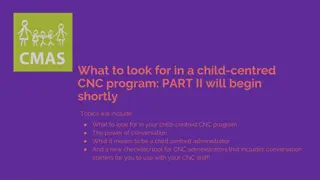Evolution of Family-Centred ECI Framework
This content explores the evolution of the theoretical framework for Family-Centred Early Childhood Intervention (ECI) services in Greece, focusing on the rights of children, early identification, and intervention for disabilities. It delves into global reports, legal and political foundations, and key policy messages related to ECI.
Download Presentation

Please find below an Image/Link to download the presentation.
The content on the website is provided AS IS for your information and personal use only. It may not be sold, licensed, or shared on other websites without obtaining consent from the author.If you encounter any issues during the download, it is possible that the publisher has removed the file from their server.
You are allowed to download the files provided on this website for personal or commercial use, subject to the condition that they are used lawfully. All files are the property of their respective owners.
The content on the website is provided AS IS for your information and personal use only. It may not be sold, licensed, or shared on other websites without obtaining consent from the author.
E N D
Presentation Transcript
Technical Support to implement reforms to support the development of family centred early childhood intervention Technical Support to implement reforms to support the development of family centred early childhood intervention services in Greece services in Greece - - ECI Greece Grant Agreement n Grant Agreement n 101048313 ECI Greece 101048313 Family-Centred Early Childhood Intervention Training PPT 3: Evolution of the ECI theoretical framework and the most up-to-date definitions 1
UNCRC: Article 6 - Children have the right to develop to the greatest extent possible UN Committee on the Rights of the Child: General comment on the application of the rights of the child in early childhood UNCRPD: Legal and political basis Legal and political basis for early childhood for early childhood intervention intervention Article 7: Children with disabilities enjoy all human rights and fundamental freedoms on an equal basis with other children. Article 25: States shall provide early identification and intervention as appropriate, and services designed to minimize and prevent further disabilities 2
UNDP, UNESCO, UNICEF and the World Bank Report on "Education for All", 1990 UNESCO Holistic Early Childhood Development Index (HECDI) Legal and political basis for early childhood intervention Global Partnership Strategy for Early Childhood 2021 2030 Global Monitoring Report on "Education for All". UNICEF Report, The State of the World's Children: Early Childhood , 2001 OECD: Starting Strong Report , 2006 European Agency for Development in Special Needs Education ECI Key Policy Messages , 2012 The European Commission Working Group on Early Childhood Education and Care (ECEC): Report of the Expert Group of the Directorate-General for Education, Youth, Sport and Culture (DG EAG) of the European Commission. 3
To whom is Early Childhood Intervention addressed? What is Early What is Early Childhood Childhood Intervention? Intervention? How is it provided (how, by whom, where) ? What does it involve? What is the objective? 4
1stGeneration Programmes Pure biomedical and therapeutic character Early Childhood Early Childhood Intervention. Intervention. Evolution of Evolution of perspectives and perspectives and interventions interventions Performed exclusively in special settings Focused exclusively on children with different conditions. Aimed at improving or preventing the worsening of children s conditions/deficits Followed a one-dimensional scientific approach (Bairrao & Almeida, 2003). 5
2ndGeneration Programmes Moving away from single focus on the child Early Childhood Intervention. Evolution of perspectives and interventions Recognition of the crucial role played by the family and social support networks in promoting the development of the child and reinforcing the capabilities and confidence of parents First references to empowerment, focusing on family strengths and resources 6
3rdGeneration Programmes Focus on: daily experiences and learning Early Childhood Early Childhood Intervention. Intervention. Evolution of Evolution of perspectives and perspectives and interventions interventions opportunities of children support for parenting capabilities family, community resources and social inclusion. 7
The term early childhood intervention is used for services provided to children from birth to 3 years of age who are at risk or have developmental delays or disabilities . What is Early What is Early Childhood Childhood Intervention? Intervention? Contemporary Contemporary Definitions Definitions Such an intervention differs from intervention in older children as it a) focuses on the family activities and routines; b) includes many disciplines: speech therapists, physiotherapists, occupational therapists, special educators, social workers, psychologists, who provide their services outside traditional educational settings and in a non-traditional educational way. American Speech Hearing Association (ASHA, 2003) 8
ECI is a composite of services/provision for very young children and their families, provided at their request at a certain time in a child s life, covering any action undertaken when a child needs special support to: Ensure and enhance her/his personal development; Strengthen the family s own competences, and Promote the social inclusion of the family and the child. What is Early What is Early Childhood Childhood Intervention? Intervention? Contemporary Contemporary Definitions Definitions These actions are to be provided in the child s natural setting, preferably at a local level, with a family-oriented and multidimensional teamwork approach. (European Agency for Development in Special Needs Education, Early Childhood Intervention Analysis of Situations in Europe. Key Aspects and Recommendations 2005, p. 17). 9
Early Childhood Intervention (ECI) is the process of providing specialised support and services for infants and young children with disability and/or developmental delay, and their families in order to promote development, well-being and community participation. What is Early Childhood Intervention ? Contemporary Definitions The aim of early childhood intervention is to ensure that parents and other important adults in the child s life can provide young children with disability and/or developmental delay with experiences and opportunities that help them gain and use the skills they need to participate meaningfully in their everyday lives. Early Childhood Intervention Australia (ECIA), 2016 www.ecia.org.au 10
The goal of ECI is to provide support and services to the families of children between 0 and 6 years of age, with developmental delay, disability developmental delay due to biological and/or environmental conditions, actively involving the formal and informal social support networks, which in turn will directly and indirectly influence the functioning of the child and the family. or serious risk of What is Early Childhood Intervention ? Contemporary Definitions The specificity of ECI consists precisely in this focus on promoting child development through an intervention plan that optimises learning opportunities in the natural contexts of their daily lives, developed together with the family and other relevant care providers in the child's life. Recommended Practices in Early Childhood Intervention: A Guidebook for Professionals ANIP, Associa o Nacional de Interven o Precoce, 2016 11
The everyday experiences and opportunities afforded infants, toddlers, and young children by the children s parents and other primary caregivers in the context of naturally occurring everyday learning activities that are intended to promote children s acquisition and use of behavioural competencies influencing prosocial interactions with people and materials What is Early Childhood Intervention ? Contemporary Definitions shaping and (Dunst, Raab, Trivette, & Swanson, 2010, p. 62) 12
Children develop best in nurturing environments - (Biglan, 2012) Basic environments for young children are relational, children learn and develop through relationships, the quality of which literally changes their brain neurologically and neurochemically. (Richter, 2012; Cozolino, 2006) The key features of care relationships are attunement, engagement and responsiveness, (Moore, 2009) The participation in everyday settings is vital for the health, development and quality of life of all children (Law et al, 2006) These key developmental and learning features apply to children with or without disabilities (King et al., 2002; Moore, 2009; Warren & Brady, 2007) Research data Research data supporting supporting contemporary contemporary definitions of definitions of early childhood early childhood intervention intervention 13
1. Community approach to identifying potentially eligible children 2. Developmental screening and/or supervision in collaboration with physicians What do Early Childhood Intervention services provide? 3. Referral management by intensive care units, doctors, parents, social services, kindergartens, etc. 4. Integrated & specialized development assessments 5. Family , parental care, nutrition and safety assessments 6. Development, implementation and monitoring of Individualized Family Service Plans (IFSP) 7. Regular visits to the child's natural environment Emily Vargas-Bar n, Building and strengthening integrated national early childhood intervention (ECI) systems, 2021 14
8. Case management 9. Reviews of assessments & Individualized Family Service Plans What do Early Childhood Intervention services provide? 10. Optional: Manufacture of toys, peer group sessions, family counselling, respite services, etc. 11. Transition services (e.g. nursery, kindergarten, day care centre) 12. Advocacy & public information/awareness-raising services 13. Networking activities Emily Vargas-Bar n, 2021 15
Guiding Principles of Early Childhood Intervention European Agency for Development in Special Needs Education, 2004 16
European Association of Service providers for Persons with Disabilities Thank you! 18
